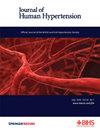健康生活方式知识和高血压诊断年龄:孟加拉国基于初级卫生保健的调查。
IF 3.4
4区 医学
Q2 PERIPHERAL VASCULAR DISEASE
引用次数: 0
摘要
本研究调查了孟加拉国农村人口中高血压个体的健康生活方式知识与高血压诊断年龄之间的关系。这项横断面研究是在农村人群中的高血压成年人(18-80岁)中进行的。我们从40个随机选择的社区药房获得了3600名高血压患者的数据。我们收集了人口统计数据,健康知识,并测量了生命体征,包括高血压诊断年。采用多项logistic回归分析,确定生活方式和高血压知识因素与高血压诊断年龄的关系。高血压诊断的平均年龄为45.84岁。男性受试者高血压诊断的平均年龄高于女性(48.1岁vs 44.4岁)。我们的研究发现,男性和受过初等教育的个体更有可能得到较晚的高血压诊断(优势比= 2.32;95%置信区间:1.75-3.10,优势比= 5.96;95%置信区间分别为3.09-11.48)。最贫困和缺乏体育锻炼的人后期诊断的几率更高(优势比= 2.20;95%置信区间:1.53-3.15,优势比= 2.37;95%置信区间分别为1.78-3.17)。相反,高血压家族史会降低患病几率(优势比= 0.38;95%置信区间:0.27-0.55)。增加对健康生活方式因素的了解和参与与健康相关的媒体与后期诊断相关,突出了教育和意识对高血压发现年龄的影响。我们的研究表明,健康生活方式的知识与高血压诊断的年龄有关。针对特定年龄组的健康教育计划可以减少高血压相关并发症。本文章由计算机程序翻译,如有差异,请以英文原文为准。

Healthy lifestyle knowledge and age at hypertension diagnosis: a primary health care based survey in Bangladesh
This study examined the relationship between knowledge of healthy lifestyles and the age of hypertension diagnosis among hypertensive individuals within Bangladeshi rural population. This cross-section study was conducted among hypertensive adults (18–80 years) in a rural population. We obtained data from 3600 adults with hypertension from 40 randomly selected community pharmacies. We gathered data on demographics, health knowledge, and measured vital signs, including hypertension diagnosis year. Multinomial logistic regression analysis was used to identify the lifestyle and knowledge factors about hypertension with the age of diagnosis of hypertension. The mean age of hypertension diagnosis was 45.84 years. The mean age of hypertension diagnosis of male participants was higher than female (48.1 vs 44.4 years). Our study found that males and individuals with primary education are more likely to receive a later hypertension diagnosis (odds ratio = 2.32; 95% confidence interval: 1.75–3.10 and odds ratio = 5.96; 95% confidence interval: 3.09–11.48 respectively) for those aged ≥65. The poorest and those lacking physical exercise faced higher odds of later diagnosis (odds ratio = 2.20; 95% confidence interval: 1.53–3.15 and odds ratio = 2.37; 95% confidence interval: 1.78–3.17 respectively). Conversely, a family history of hypertension reduces the odds (odds ratio = 0.38; 95% confidence interval: 0.27–0.55). Increased knowledge of healthy lifestyle factors and engagement with health-related media correlate with later diagnosis, highlighting the influence of education and awareness on hypertension detection age. Our study reveals that knowledge of a healthy lifestyle is associated with the age of hypertension diagnosis. Targeting specific age groups based on health education programs may reduce hypertension-related complications.
求助全文
通过发布文献求助,成功后即可免费获取论文全文。
去求助
来源期刊

Journal of Human Hypertension
医学-外周血管病
CiteScore
5.20
自引率
3.70%
发文量
126
审稿时长
6-12 weeks
期刊介绍:
Journal of Human Hypertension is published monthly and is of interest to health care professionals who deal with hypertension (specialists, internists, primary care physicians) and public health workers. We believe that our patients benefit from robust scientific data that are based on well conducted clinical trials. We also believe that basic sciences are the foundations on which we build our knowledge of clinical conditions and their management. Towards this end, although we are primarily a clinical based journal, we also welcome suitable basic sciences studies that promote our understanding of human hypertension.
The journal aims to perform the dual role of increasing knowledge in the field of high blood pressure as well as improving the standard of care of patients. The editors will consider for publication all suitable papers dealing directly or indirectly with clinical aspects of hypertension, including but not limited to epidemiology, pathophysiology, therapeutics and basic sciences involving human subjects or tissues. We also consider papers from all specialties such as ophthalmology, cardiology, nephrology, obstetrics and stroke medicine that deal with the various aspects of hypertension and its complications.
 求助内容:
求助内容: 应助结果提醒方式:
应助结果提醒方式:


